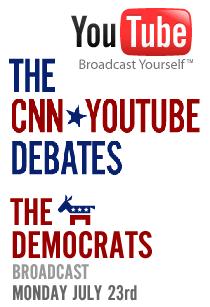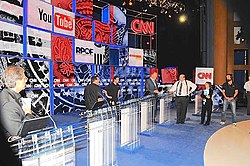This article has multiple issues. Please help improve it or discuss these issues on the talk page . (Learn how and when to remove these messages)
|
The CNN/YouTube presidential debates were a series of televised debates held during the 2008 Republican Party and Democratic Party presidential primaries that were sponsored by CNN and YouTube. In the debates presidential primary candidates who were invited to the debate and still had active campaigns at the debates airing. participated and fielded questions submitted through YouTube. The Democratic Party installment took place in Charleston, South Carolina and aired on July 23, 2007. The Republican Party installment took place in St. Petersburg, Florida and aired on November 28, 2007.

